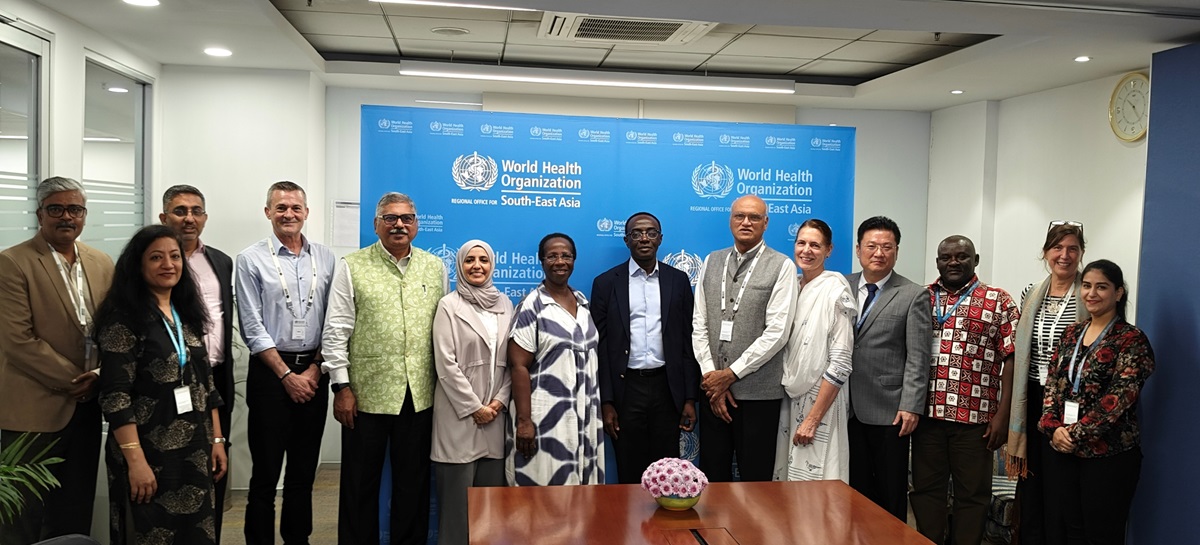This year’s meeting held in a hybrid format from 7 to 9 July in New Delhi, India witnessed diverse participation from across the region and beyond. The meeting brought together over 70 participants, including national immunization programme representatives from nine countries in the WHO South-East Asia Region, immunization focal points from WHO and UNICEF headquarters, regional and country offices, the Chairperson of the South-East Asia Regional Immunization Technical Advisory Group, and key partners such as Gavi, the Vaccine Alliance, International Federation of Red Cross and Red Crescent Societies, Coalition for Epidemic Preparedness Innovations, Department of Foreign Affairs and Trade of the Australian Government, and World Bank.
Established in 2007, the RWG serves as the primary regional forum for partner coordination, technical collaboration, and strategic planning in immunization in the WHO South-East Asia Region. This year’s meeting focused on reviewing progress towards the Regional Vaccine Implementation Plan (RVIP) 2022–2026, addressing persistent immunization gaps, the recently evolving funding constraints aligning with Gavi’s new Strategy 6.0.
The WHO Regional Director Ms Saima Wazed, emphasized in her opening remarks, delivered by the Director of Programme Management Dr Thaksaphon Thamarangsi, the RWG’s pivotal role in advancing immunization programmes across the South-East Asia Region over the past two decades. The Regional Director, in her message, acknowledged the region’s immunization successes but underscored ongoing challenges, including unvaccinated children, the impact of the COVID-19 pandemic, and a dynamic donor landscape. She outlined eight strategic priorities to sustain hard-earned gains, ranging from health system integration and cost-saving vaccine strategies to domestic resource mobilization and community engagement.
Key highlights:
- Regional progress and gaps: While the region has made significant achievements in expanding vaccine access and introducing new vaccines, major challenges persist. The number of zero-dose children rose to 2.72 million in 2023, and several countries reported large and disruptive measles outbreaks.
- UNICEF contributions: UNICEF highlighted its work in immunization demand generation, gender-responsive programming, digital health, and sustainable financing. Behavioral insight studies, digital tools, and community engagement models were showcased as key enablers of vaccine uptake.
- Gavi 6.0 Strategy: Gavi’s new strategy emphasizes equity, sustainability, and innovation, aiming to protect 500 million children and avert 8–9 million deaths by 2030. However, a funding gap of $2.9 billion remains, prompting a recalibration of priorities and optimization of immunization programmes and support mechanisms.
- Country presentations: Delegates from Bangladesh, Bhutan, the Democratic People’s Republic of Korea, India, Maldives, Myanmar, Nepal, Sri Lanka, Thailand, and Timor-Leste shared updates on national immunization strategies, challenges, and support needs. Common themes included funding constraints, vaccine hesitancy, digital transformation, and the need for stronger surveillance systems.
- Updated RWG terms of reference (TORs): A closed-door session reviewed and adopted evolved RWG ToRs to enhance partner coordination, engage new partners, advocacy, and strategic alignment in light of funding uncertainties and shifting donor priorities
- Looking ahead: The RWG has outlined a consolidated workplan to accelerate progress toward regional immunization goals, prioritizing and optimizing immunization and disease surveillance programmes, strengthening health systems, enhancing cross-border collaboration, and conducting joint high-level advocacy for increased domestic and donor financing.
This meeting marks a pivotal moment for immunization programmes in the WHO South-East Asia Region. Despite ongoing challenges, all partners stand united in their commitment to protecting every mother and child through equitable and resilient immunization systems.
.png)
